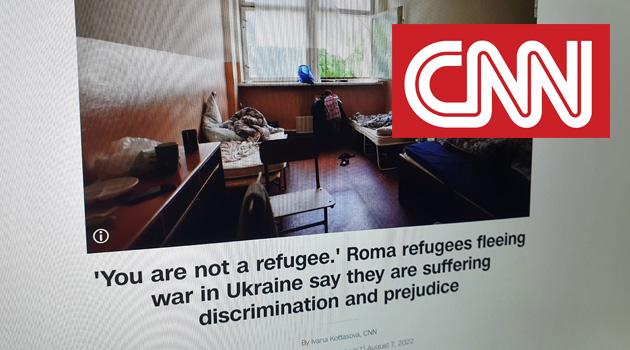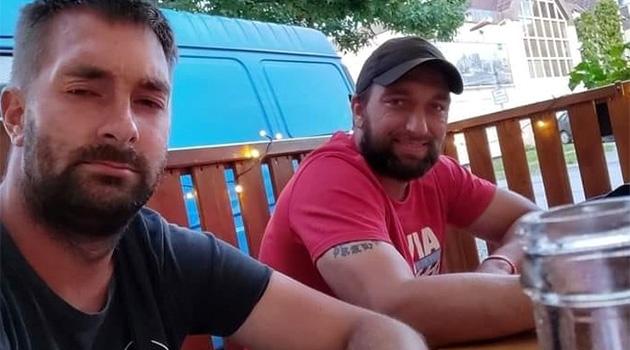CNN: Czech Republic has discriminated against Romani refugees from Ukraine, updated data refute the myth that they all hold dual citizenship

The online news server of the multinational cable news channel headquartered in the USA, CNN, has published an extensive article about discrimination against Romani refugees from Ukraine in the Czech Republic and other states of what used to be called the eastern bloc, confirming previous reporting by news server Romea.cz on this discrimination, which has been underway since the beginning of the Russian Army’s February occupation of Ukraine. Furthermore, CNN has also obtained updated data on the number of refugees from Ukraine in the Czech Republic who are dual citizens and, just like the numbers publicized previously, the new data confirm that Czech politicians made untrue statements when they alleged that “many” Romani refugees from Ukraine hold dual citizenship.
Fleeing the Russian Army, only to end up behind barbed wire in the Czech Republic
CNN gives the example of Luiza Baloh and her family, who fled Dnipro in central Ukraine and then ended up behind barbed wire in the Czech Republic in a former detention center that had been refashioned into a center for humanitarian registration for refugees from Ukraine – she was sent to the facility, which resembles a prison, along with other families, predominantly Romani ones, while tens of thousands of other refugees from Ukraine found places to stay in privately-owned properties or residential hotels in the Czech Republic, CNN reports. “It was like a prison,” Baloh told CNN.
“It was bad. I was afraid there, there were so many people, many scary people,” the Romani refugee from Ukraine described her experience.
Baloh’s story has also been confirmed to CNN by NGO representatives. “Roma refugees [from Ukraine] are automatically placed into non-standard accommodation,” Patrik Priesol, head of the Romodrom organization’s program for Ukrainians, told CNN.
“It is very saddening and I am not afraid to say it amounts to institutional racism and segregation,” Priesol told CNN. The bad conditions in the Czech Republic’s detention facilities, especially at the beginning of the influx of refugees from Ukraine, were also confirmed to CNN by Nikol Hladíková, head of the Center for Social Services Prague‘s department of humanitarian aid.
“My first visit to one of [the facilities], we came with a bus full of refugees and I turned the bus back because the situation there was absolutely horrendous,” she told CNN. “There was dirt and excrement everywhere, there was no kettle to boil water and we had a one-month-old baby with us, “Hladíková recounted, adding that conditions at the facility improved after she and another colleague warned those who were in charge of the situation.
Baloh left that “prison accommodation”, but by doing so she also left the aid system for refugees in the Czech Republic entirely, and just like hundreds of other Romani refugees from Ukraine, she ended up living at the main railway station in Prague. “She was told by authorities that she was no longer eligible for help, because she had ‘rejected’ the accommodation she had been offered,” CNN describes the approach taken by the Czech authorities.
Priesol confirmed to CNN that what happened to Baloh was a common scenario for which the authorities’ badly-handled communications were frequently to blame. “Some of these people are functionally illiterate, they are in a post-traumatic situation, and they are offered a place in a detention facility that is temporarily turned into an accommodation facility, and they are told ‘this prison here is your home now’,” he explained.
The last resort: Camps for Romani refugees from Ukraine
Baloh and her children eventually ended up in the refugee camp in Prague’s Troja quarter. CNN got access to the camp and has described it to its English-language readers as follows: “Large military-style tents surround a plaza that is partially shaded by gazebos. There are portable toilets and mobile shower units and meals are served three times a day. Most of the residents are Roma and many come from some of the poorest areas of Ukraine.”
Representatives of the refugee camp told CNN it is the location to which the authorities are sending those whom they claim are not entitled to aid. “The Czech government said people who do not receive temporary protection status can stay for a few days and then leave the country,” CNN reports.
Baloh told CNN that just like the several dozen other refugees living in the camp, she would prefer to remain in the Czech Republic long-term because she has no home to which to return in Ukraine. “I would like my children to go to school. I’d like to work. I had a job in Ukraine, I was a cleaner in a restaurant,” she told CNN.
Czech government alleged dual citizenship is a fundamental problem, the numbers show that was never the case
CNN has also reported on the dual citizenship phenomenon, which the Czech authorities and politicians have presented as the reason it has taken so long to vet refugees as well as the reason why some Romani refugees from Ukraine cannot be provided with aid. CNN has reported that Czech Interior Minister Vít Rakušan said in May that such vetting was necessary because of the “mostly Romani refugees” who allegedly hold both Hungarian and Ukrainian citizenship and allegedly had come to the Czech Republic to exploit the welfare system.
Authorities refused to provide news server Romea.cz with any data about the number of refugees from Ukraine with dual citizenship for several weeks in May and June. Eventually Czech Television reporter Richard Samko succeeded in acquiring hard data in June.
“To date, we have applied for a review of approximately 5,500 cases, with the result that we found about 150 people who actually have dual citizenship,” Ondřej Moravčík, spokesperson for the Police Presidium, told Czech Television on 11 June. CNN has now acquired new, updated data from the Czech authorities that has definitively confirmed that politicians’ statements about a large number of Romani refugees from Ukraine holding dual ciitzenship were untrue.
“The Czech government framed the dual citizenship of Roma refugees as a major issue, even sending a special diplomatic letter to the Hungarian government, according to a statement by the Ministry of Interior. But there is very little evidence that it was ever a widespread problem,” CNN reports.
“The Czech Ministry of the Interior told CNN the police had conducted 7,100 checks and found 335 instances of people holding dual citizenship. It said there were 201 people with Hungarian citizenship and 66 with Polish citizenship. The rest held citizenships of a number of other EU countries,” CNN reports.
In other words, less than 3 % of the refugees from Ukraine are also citizens of Hungary. As of the beginning of 2011, Hungary made it possible for anybody who could document direct Hungarian ancestry and at least a basic knowledge of the Hungarian language to become a citizen.
By the year 2017, Hungary had distributed one million such passports. Hungarian citizenship was acquired this way mostly by inhabitants of neighboring countries – Romania, Serbia, Slovakia and Ukraine.
Hungarian Prime Minister Viktor Orbán distributed these passports for simple reasons. He wanted to acquire new voters for his party.
Many other states condemned those actions, which Priesol brought to CNN’s attention. “We all criticized Orban’s regime for this, we all protested against it, we knew that it put people into a legal trap and now we [i.e., the Czech Republic] are using it to our advantage. It’s a pinnacle of hypocrisy,” Priesol said.
Czech Republic, Moldova, Romania… Romani refugees from Ukraine have the same experience everywhere they go
CNN reports that the Czech Republic has received more than 400,000 refugees from Ukraine and that the Czech government has adopted an EU law that makes it possible for refugees fleeing Ukraine to apply for temporary protection status, access medical care, and begin working at their destination of refuge. The Czech authorities have, from the beginning, refused to acknowledge that any differentiated approach is being taken toward Romani refugees from Ukraine and reiterated that claim to CNN, which has reported on how the Czech Republic, Moldova and Romania are treating Romani refugees.
“CNN visited shelters and spoke to a number of refugees, social workers and activists in the Czech Republic, Romania and Moldova. In all three countries, the problems Roma refugees face are uncannily similar,” CNN reports.
It is common for Romani refugees from Ukraine to be accused of not being citizens of Ukraine and to be segregated into accommodation of lower quality. According to more than one NGO, many such refugees are provided with misleading information about their rights, and problems that can be easily solved when faced by non-Romani refugees from Ukraine – for example, the lack of a border crossing stamp in a passport – are frequently used as reasons to refuse temporary protection to Romani refugees from Ukraine.
